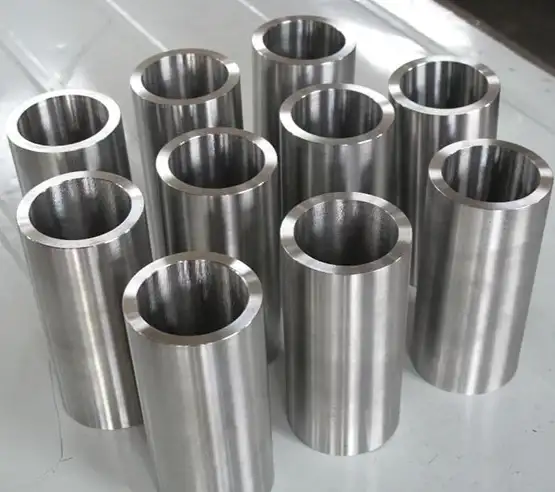In 2025, expect commercial Inconel® 625 mill-products to trade roughly in the $20–$40 per pound band depending on product form (sheet, bar, pipe), quantity, and origin; typical mid-market quotations for common mill forms cluster around $23–$30 per lb today. Prices vary by region and product specification, and are primarily driven by nickel commodity movements plus alloy surcharges, manufacturing form, and certification requirements.
If you need certified Inconel 625 quickly and at competitive cost, expect to pay more for small lots, tight tolerances, and fully certified aerospace or nuclear test packs. Buying direct from a factory supplier with inventory—and negotiating by form/lot—reduces per-pound cost. MWalloys supplies Inconel 625 from China with factory pricing, ready stock for fast shipment, and full material traceability for industrial and oil & gas end uses.
what is Inconel 625 (standards & properties)
INCONEL® alloy 625 (UNS N06625) is a nickel-chromium-molybdenum-niobium solid-solution strengthened superalloy designed for high strength and exceptional corrosion resistance over a wide temperature range. Typical service extends from cryogenic to several hundred degrees Celsius (and higher in specific configurations). The alloy designation, typical forms (sheet/plate, bar, pipe, wire), and established datasheets are published by the alloy owner and material databases; purchasers typically reference UNS N06625 and the relevant ASTM/ASME or AMS product standards for forms and testing.
Common standards and documents to reference in purchase orders
-
UNS N06625 / W.Nr. 2.4856 (alloy chemistry designator).
-
ASTM / ASME standards for forms (e.g., ASTM B443 for plate, ASTM B446 for bars, ASME SB-xxx product specs — confirm specific POs).
2025 market snapshot: current price ranges (per pound) by common form
Note: price quotes depend on lot size, surface finish, heat treatment, full mill test certificates (MTC), and export packaging. The ranges below are compiled from active market quotes and industry price indexes in mid-2025.
-
Plate / sheet (commercial thicknesses): $20 – $40 / lb (typical retail/mill buyer ranges vary by thickness and finish).
-
Round bar / rod (common diameters): $23 – $36 / lb (larger diameters and precision grades carry premiums).
-
Seamless pipe / tube: $25 – $45 / lb (small OD, thin-wall, or NDT/tested pipe costs more).
-
Wire / welding consumables: $30 – $60 / lb (small diameters, drawing and control add cost).
The ranges above reflect mill and distributor offers in 2025 and should be used for budget planning rather than firm procurement — always request a written quotation with lead time and MTC.
Past five years: estimated annual price ranges and what happened
Below is a buyer-oriented summary (annual approximate ranges per pound for common mill products, based on market surveys, price indexes, and supplier quotes). These are compiled estimates (not single-source fixed contracts); they show the broad trend and are footnoted to data sources and industry reports.
| Year | Approx. Inconel 625 price (USD / lb) — typical mill form ranges | Key driver(s) |
|---|---|---|
| 2021 | $12 – $22 / lb | Post-pandemic recovery, high nickel volatility, supply chain disruption. |
| 2022 | $18 – $30 / lb | Strong demand and raw material surcharges (nickel & molybdenum spikes). |
| 2023 | $16 – $28 / lb | Volatility continued; some easing mid-year due to inventory normalization. |
| 2024 | $18 – $32 / lb | Recovery in industrial activity; regional supply tightness in certain forms. |
| 2025 (current) | $20 – $40 / lb (typical midpoint $23–$30) | Elevated but varied: raw nickel price, alloy surcharges, freight, and certification demand. |
Caveat: those annual bands are meant to orient budgeting and negotiation. Specific mill products (e.g., thick plate, precision bar, or certified pipe) can fall outside these ranges. Market indexes and mill surcharge schedules (published by alloy owners and trade houses) are the best sources for exact surcharge numbers.

Global price comparison (2025) — per lb, typical ranges by region
This table summarizes commonly reported ex-works / EXW ranges as seen in regional indexes and supplier offers (rounded). Final landed cost will change with freight, duties, and local taxes.
| Region | Typical range (USD / lb) | Notes & references |
|---|---|---|
| United States | $24 – $38 / lb | Mill & distributor quotes; higher for certified aerospace grades. |
| Europe (EU) | $25 – $40 / lb | Local mill premiums and VAT/delivery affect landed price. |
| China (domestic & export) | $18 – $30 / lb | Factory stock lots often cheaper; buyer must verify MTC & heat/lot trace. |
| India | $20 – $33 / lb | Smaller local mills + import offers; quality control is key. |
| Middle East / MEA | $23 – $36 / lb | Regional indexes report higher sheet/plate premiums Q1 2025. |
How to interpret: China factory EXW offers can be substantially lower on paper; landed cost parity depends on shipment size, incoterms, and import compliance. MWalloys emphasizes 100% factory pricing and fast stock dispatch to lower total landed time and cost for global customers.
Principal factors that drive Inconel 625 pricing
-
Nickel commodity price (primary driver): Inconel 625 contains a high nickel fraction; LME nickel movements strongly affect alloy cost. Industry indexes and mills tie a portion of the alloy price to nickel and other element surcharges.
-
Molybdenum and niobium substitutes/surcharges: Those alloying elements are costly; mills apply surcharges when feedstock costs rise.
-
Product form and processing: Plate rolling, forging, seamless tubing, and precision bar drawing add labor and mill cost; small diameters or tight tolerances command premiums.
-
Quantity and lot size: Larger buys dilute fixed mill setup and testing costs; small orders are pricier per pound.
-
Certification & testing: Nuclear, aerospace, or API test packs add non-recurring charges; MTCs, PMI, NDT, and special traceability cost more.
-
Freight, insurance, and tariffs: Ocean freight spikes, insurance, and temporary trade measures can swing landed cost significantly.
-
Inventory & lead times: Tight mill lead times or low distributor stock push spot premiums; conversely, stocked factory lots can be cheaper.
Procurement checklist: avoid hidden costs
-
Specify exact UNS/ASTM/ASME designations in the PO (UNS N06625, relevant ASTM product numbers).
-
Request full MTC (mill test certificate) and confirm batch/heat numbers.
-
List required non-destructive tests (e.g., PMI, UT, RT) and include them in the RFQ to avoid surprise charges.
-
Ask for sample photos and dimensional certificates for small diameters or specialty finishes.
-
Clarify incoterm (EXW / FOB / CIF) and who bears freight, insurance, and duties.
-
Negotiate volume discounts and multi-lot allocations if you have recurring needs.
-
Confirm packaging & export documentation (especially for critical projects — restrictions can delay shipments).
-
Get a Formal Quote with validity dates — metal markets move fast.
How to specify Inconel 625 to avoid overpaying
-
State UNS N06625 and the precise product standard (e.g., ASTM B443 for plate or ASTM B446 for bar).
-
Provide drawing tolerances, surface finish class, and heat treatment requirements.
-
Declare required tests/certificates (e.g., EN 10204 3.1/3.2 MTC). If not needed, omit to reduce cost.
-
Limit overly tight tolerances unless functionally necessary; tighter specs drive higher mill rejection and rework cost.
-
For high-temperature or corrosive service, demand material traceability and proper heat numbers.
Supplier selection: what to ask (and why MWalloys)
When qualifying a supplier ask for:
-
Factory capability (melting source, forging, rolling capacity).
-
Inventory photos and stock list (reduces lead time).
-
MTC copies and QA/QC credentials (ISO, API, ASME where applicable).
-
Sample test reports (mechanical, chemical, and NDT).
-
Export experience with your market and proven freight partners.
Why MWalloys?
MWalloys positions itself as a Chinese factory supplier with in-house metal sourcing and a stock-based model. We offer 100% factory pricing, rapid dispatch from inventory for standard sizes, and assistance with certification documentation—helpful when purchasing higher-cost alloys where traceability matters. (Promotional claims should be validated in the supplier contract.)
Short-term and medium-term outlook (what buyers should prepare for)
-
Short term (next 6–12 months): Expect continued sensitivity to nickel price swings and regional inventory cycles. Tightness in specific mill products (seamless tube, large plate) may keep premiums elevated. Use hedging tools or longer lead-time contracts to fix price where possible.
-
Medium term (12–36 months): Demand from energy, petrochemical, and select industrial sectors will largely determine the base trend. Innovations in recycling and alternative feedstock may moderate long-term upward pressure, but alloying element scarcity or geopolitical events could produce spikes.
FAQs
-
Q: What is the typical minimum order quantity (MOQ)?
A: MOQ varies by form. Many Chinese factories offer small cut-lengths at MOQ ~100 kg for plate/wire and 1–5 bars for round stock; mill minimums can be 500–1000 kg. Ask supplier for stocked lengths vs mill runs. -
Q: Can I buy small samples?
A: Yes—most suppliers will sell sample pieces or cut lengths for evaluation but expect higher per-pound cost for small sizes. -
Q: How much does certification cost?
A: Extra cost depends on test scope (MTC, PMI, heat treatment records, NDT). Certified API/nuclear packs can add materially to unit cost; request individual quotes. -
Q: Is Inconel 625 magnetic?
A: No, Inconel 625 is essentially non-magnetic in the annealed condition due to its austenitic, nickel-rich matrix. -
Q: How is price affected by heat numbers and traceability?
A: Full batch/heat traceability increases paperwork and QC; expect a modest surcharge compared to uncertified commercial lots. -
Q: How to compare quotes fairly?
A: Ensure identical incoterms, same MTC level, identical tolerances, and same test scope are quoted. Always compare total landed cost. -
Q: Does surface finish affect cost?
A: Yes — polished, bright-drawn, or ground finishes add processing cost and raise per-lb price. -
Q: Can Chinese factory prices be trusted for quality?
A: Many Chinese mills produce to international standards; audit the supplier, ask for third-party inspection, and verify MTCs. -
Q: Is recycling or scrap content used?
A: High-performance nickel alloys are tightly controlled; reputable mills maintain strict chemistry and low scrap blending for critical grades. -
Q: How to hedge against price volatility?
A: Use longer-term framework contracts, fixed-price call-offs, or commodity hedges and negotiate roll-over clauses in large contracts.
Practical negotiation levers (how to reduce per-lb cost)
-
Bigger lot sizes (concentrate purchases to reduce fixed mill charges).
-
Accept standard tolerances and finishes if possible.
-
Agree on longer lead times for better mill scheduling discounts.
-
Combine similar alloys in a single shipment to share freight cost.
-
Use EXW/FOB with trusted forwarder to control shipping and insurance.
Short primer on authority & testing (which documents buyers should request)
-
Mill Test Certificate (EN 10204 type 3.1/3.2) — chemical and mechanical confirmation from the mill.
-
Heat/lot numbers for weld traceability in fabricated components.
-
NDT reports (UT/RT) when mechanical integrity is required.
-
Chemical analysis by PMI for incoming inspection is common.
Final recommendations for buyers
-
For budget planning, use $23–$30 per lb as a working central estimate for standard mill shapes (adjust by ±20% for special forms).
-
Request firm written quotes with MTC scope and incoterm.
-
If timing is crucial, prioritize suppliers with stocked inventory (like MWalloys) to reduce lead time.
-
For high-value projects, insist on third-party inspection before shipment.
Authoritative references
- Wikipedia — Inconel 625 (technical overview and references)
- FRED / U.S. Bureau of Labor Statistics — Producer Price Index: Nickel and Nickel-Base Alloy Mill Shapes
Closing (how MWalloys can help)
If you want, MWalloys can provide:
-
A free pre-quotation for the exact form and quantity you need (bar/plate/pipe), with EXW factory price and optional FOB/CIF.
-
Inventory photos, MTC samples, and lead-time commitments.
-
Assistance selecting the optimal combination of form, test scope, and shipping terms to meet your target landed cost.

